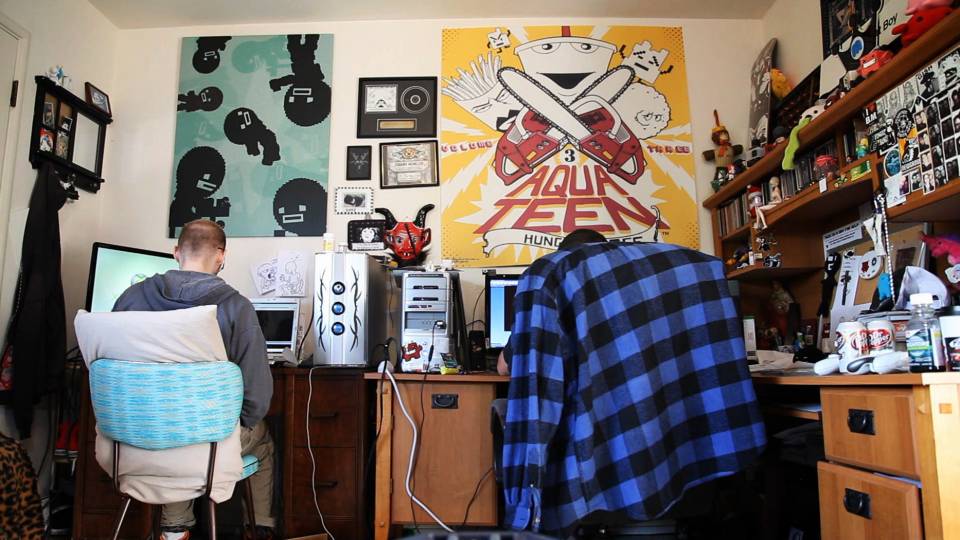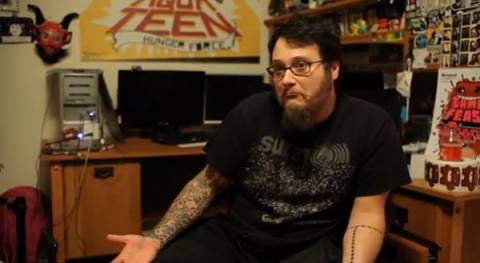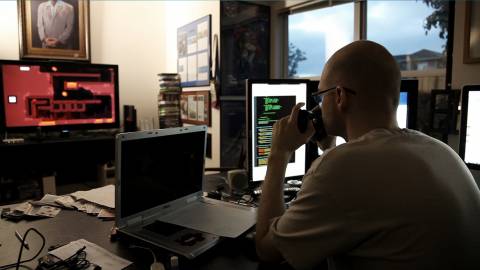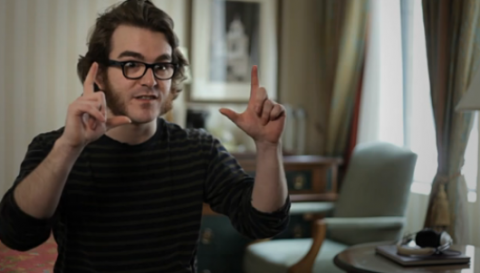
A man sits hunched over his keyboard. It's some ungodly hour of the morning, and he sits, staring at his computer screen. He subsists on a steady diet of soda and coffee, and appears not to have seen the sun in weeks. He has no social life, though this is largely of his own design. He doesn't have time for people, because he has a game to finish. The strings of code that dominate his computer monitor might as well be gibberish to most, but to the figure slumped in his office chair, it's the foundation of a video game, one that he is furiously trying to finish in order to complete it by an important marketing deadline.
This is an image that's probably all too familiar for those of us who count ourselves as enthusiasts of the video game industry. We at least have some idea of what it takes to make a game, independent or otherwise. But to those who are only tangentially familiar with what goes into these trifling digital entertainments of ours, it's a striking image. The idea of suffering for one's art is hardly anything new, but to those who don't necessarily consider video games to be art, it's an unfamiliar experience to see someone putting so much of their heart and soul into games where sentient meat sacks dodge giant saw blades and fight evil cybernetic babies with top hats and monocles.

This is what makes Indie Game: The Movie, the recently-toured documentary from Canadian filmmakers Lisanne Pijot and James Swirsky, so great and, frankly, important. There aren't very many documentaries about video games in general, a point that James and Lisanne echoed both during a Q&A at a New York City screening I attended, and in a Skype conversation I had with them yesterday. More to the point, there are even fewer documentaries about video games that are able to put the experience of game development in relatable terms to those who don't necessarily have more than a passing interest in gaming. Indie Game: The Movie does exactly that. It shows the pains and struggles of people trying to create something they're passionate about creating. It doesn't matter if they're making a video game or a film or an erotic cake. What they're making means something to these people, and by proxy of the talented filmmakers, what they're making means something to us, too.
Those of you who spend a lot of time perusing video game sites probably already have an idea of the stories contained within Indie Game: The Movie, but for those who aren't aware, a brief refresher. The film follows the development and post-development experiences of three different game makers: Fez creator Phil Fish, Team Meat members Edmund McMillen and Tommy Refenes, and enigmatic Braid designer Jonathan Blow. The three stories are varied in scope and stress--Blow, for instance, has no new game to talk about, while the others are each rushing to meet differing deadlines--but they all offer individual takes on what it takes to create an extension of one's self via video games.
Fish's story is the one that's dominated much of the media coverage, and with good reason. Fish comes off as a live wire pretty much from the moment he appears on screen. He is brutally self-effacing and incredibly anxious during this period, which was filmed about 18 months before Fez was finally released. He talks a great deal about his inspirations for the game, as well as the pressures he's found himself under after splitting with his former business partner (who is represented by a photo obscured by pixels through the entire film) and subsequent attempts to get him to sign off on an official split agreement that would allow him to show the game at PAX East.
Team Meat, on the other hand, are within sight of finishing Super Meat Boy when the film opens. We learn early on of the friendship that binds Edmund and Tommy together. Despite their bi-coastal working relationship--Edmund resides in Santa Cruz, California, while Tommy lives near his family in North Carolina--the two communicate daily, laboring dozens and dozens of hours each week to try and push Meat Boy into the stage of completion so that it can go up as part of an Xbox Live promotion in the fall of 2010. The promotion means additional marketing help that self-starters like themselves desperately need, but the game still has a lot of work to go.

Blow's role in the film is more instructional and introspective. He speaks of the development process of Braid, talking in plainspoken terms about what it meant to him to build a game he viewed as an extension of his own personality and ideas, which aren't necessarily spelled out for the player. He expresses his frustration with the fact that many players simply didn't understand the greater meanings he'd infused the game with, even acknowledging his slightly obsessive tendency to reply to nearly any commentary on the Internet that he believes misunderstands his vision.
Each of these stories contains enough intriguing information and personal drama to easily fill a 90-minute runtime, but it's the emotional elements of each story that make Indie Game: The Movie more than just a documentary about video games. Around the halfway point of the doc, Blow more or less drops out of the equation, and the directors hyper-focus on Meat Boy and Fez's big crunches. During these periods, we see these guys at their most threadbare. Edmund spends so many hours working on the game that he barely sees his wife, who often is literally sitting ten feet behind him. Tommy's only outside contact comes in brief family visits and occasional late night jaunts to a deserted local diner. Phil is an outright mess, tearing his hair out over his former business partner's either inability, or unwillingness to sign the contract that will let him show the game at PAX. In one particularly harrowing interview, Phil sits in his hotel lobby, speaking in hurried bursts of panic and rage at the prospect of coming all this way, only to be derailed by the lack of a single signature. As someone who has suffered from his own anxiety issues, I can see in this scene the makings of a full-blown panic attack occurring right in front of me. It's an uncomfortably familiar thing to watch.
Make no mistake: Indie Game: The Movie can be a very dark story. Phil at one point even confesses that he'd likely kill himself if Fez never made it to market (thankfully, it eventually did.) Whether that's viewed as pure hyperbole or a realistic threat probably depends on how well you know Phil, but from the outside, watching it on film, it felt painfully serious.
That darkness is something some game makers have taken umbrage with in regards to the film. Papo & Yo creator Vander Caballero expressed some concern over the dour tone of the film to Penny Arcade writer Ben Kuchera, saying, "'Oh, if my game doesn't work out I am over! I will kill myself!' No, make another game! Create! This is fun!" Similarly, veteran designer Derek Smart took to Twitter today to tell prospective watchers of the film to "note that not all of us devs are clueless pricks who complain all the time," while also championing Blow's commentary in the film.

While I see both Caballero and Smart's points, I don't necessarily agree that the film's portrayal of its subjects is that of chronic complainers who hate what they do. Yes, Phil and Tommy's expressions of frustration can come off like the rantings of extremely angry people, but they're angry because of situations that impede their progress on creating something they love. If anything, Indie Game: The Movie shows that developing a game is really fucking hard, and not the sort of thing that anyone can just do. That's an important perspective to show, given the current lack of knowledge much of the mainstream world has about our favorite entertainment medium.
And it's not as if there aren't triumphs to be shown. Though Blow seemingly considers his success with Braid something of a blessing and a curse, there's no question that he has the opportunity to work on his newest project mostly unencumbered by publisher meddling because he established himself with that game. When Phil finally breaks through and gets Fez shown, repeated issues with the preview build don't necessarily dampen the excitement he feels seeing people play and enjoy his labor of love. And as for Tommy and Edmund, there is perhaps no sweeter moment than seeing Edmund's wife, Danielle, break down into tears as she sees her husband's hard work pay off. This is a movie that shows both the agony and the ecstasy of game development. Maybe it leans a tad hard on the agony, but it's not as bad as some people might say.
And, of course, there are those who wonder why more perspectives weren't given. It's generally public knowledge that Pijot and Swirsky also filmed a good deal of footage with thatgamecompany's Jenova Chen, Passage designer Jason Rohrer, and Aquaria creators Alec Holowka and Derek Yu. That footage will appear on the special edition DVD and Blu-ray release, which the filmmakers say are still in production and "just need to be pressed," but didn't make it into the film because, quite frankly, it would have been just too much. In Indie Game: The Movie, Pijot and Swirsky narrow their focus to the three most compelling stories that came out of their 300 hours worth of footage, and it's better for that fact. A documentary has to have a tight, engaging narrative. Otherwise, it runs the risk of just turning into an instructional info dump. It's the same reason why it isn't just called Video Game: The Movie. While it might have been nice to get some perspective from those currently working in the more mainstream, big budget game space, it would have diluted the story at the film's core. The laser-like focus on those stories might not make Indie Game an all-encompassing view of the entire industry, but it does make it a genuinely great film.

I recommend Indie Game: The Movie for anyone who has even a passing interest in games, game development, or just the process of artistic creation in general. This is a universally watchable documentary, something the game industry has rarely had before, and desperately needs as the rest of the world becomes more and more aware of the medium. Does the film have its flaws? Certainly, but none of those flaws detract from the movie's central goal of capturing highly personal independent game development experiences, warts and all, and making them into a story anyone can appreciate.
Indie Game: The Movie is now available via iTunes, Steam, and as a DRM-free download from the film's official website. DVD and Blu-ray versions currently do not have a release date, but are in the works. Expect the movie to appear on Netflix and other streaming services sometime in the (hopefully) foreseeable future.